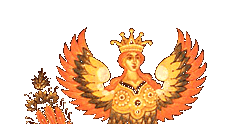VOLGA AND MIKULA
MIKULA represents the intermediate state between the embodiment of purely physical and of moral power - the stage between Svyatogor and Ilya. He partakes of Ilya's nature, as the Thunder-god, and his nightingale mare signifies, probably, the thundercloud. The assistance rendered to agriculture through the rain by the Thunder-deity led in course of time to his being regarded as the god of agriculture also, who opened the plains of heaven with his whirlwinds, ploughed them with his lightning darts, and scattered his seed broadcast over them.
The dependence of man on the seasons early suggested the idea that the gods had set the example of ploughing. Many ceremonies and traditions are preserved in various countries, which point to such a mythical significance of the plough. The Siamese, for instance, celebrate a festival in its honor, of Buddhistic origin.
Herodotus, in his description of the customs and beliefs of the ancient Scythians, the ancestors of the Slavs, gives a tradition of a plough, which fell from heaven in supernatural wise. With the possession of this plough and of a golden axe, yoke, and cup which had also fallen from heaven, went the imperial power. It may safely be affirmed that the tradition of the golden implements of agriculture proceeding from heaven comes down to us from the most remote antiquity. - The Russian peasant still sees the plough, which Mikula hurled heavenward, in the constellation of Orion.
Mikula, like Ilya, is a glorification of the peasant. Some of the Germanic chieftains were prevented from accepting Christianity, by the thought that they should be obliged to enjoy heaven in the mixed society of common people, and even of slaves. On the other hand, Slavic traditions all represent the princely powers as derived from simple tillers of the soil; and in the Bohemian Chronicle of Kosma of Prague, dating from the twelfth century, it is asserted that "we are all made equal by nature" ( Quia facti sumus omnes cequales per nature) - a characteristically Slavic utterance in the midst of feudal Europe.
St. Nicholas, always called Mikola , has taken Mikula's place as the Christian deity of agriculture, and is a very great favorite among the peasant brethren of the "Villager's Son."
The affair of the bridge strongly resembles one at the bridge of Ovruch, related in the Chronicles, where perished Oleg Svyatoslavich - the Volga Vseslavich of the epic song.
|



